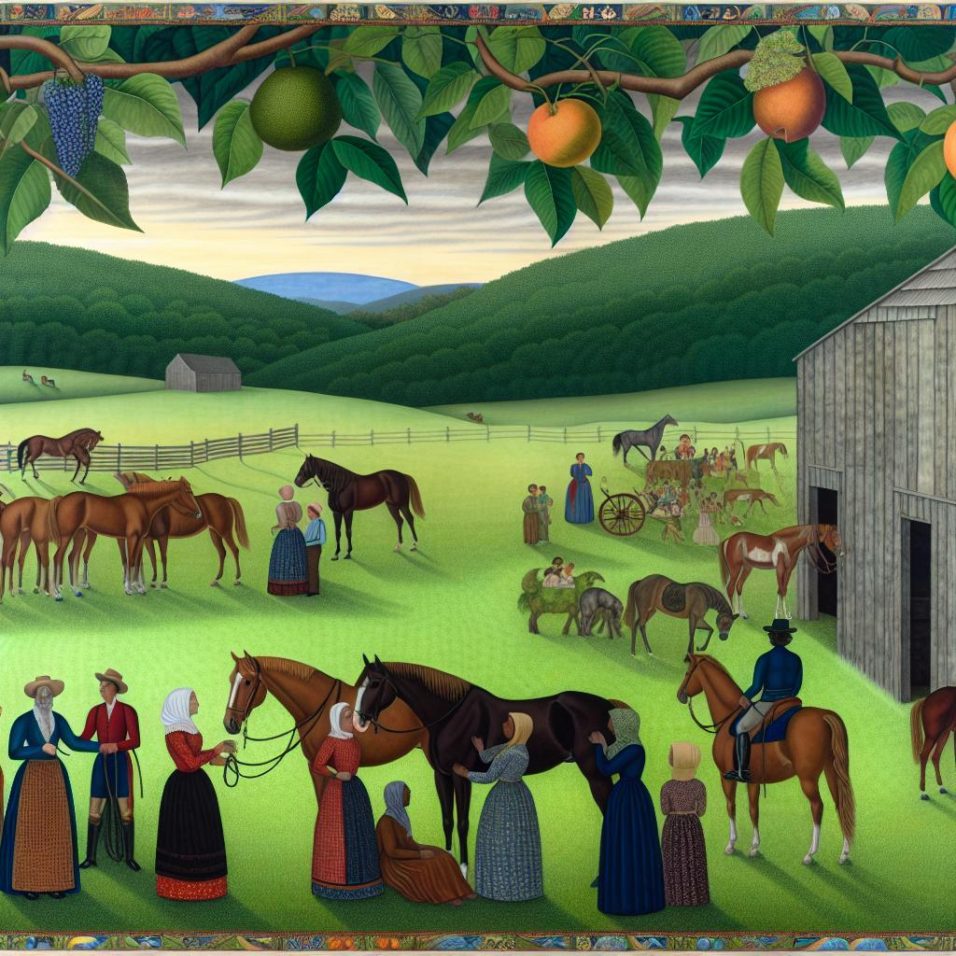The Historical Significance of Horses in Virginia
The presence of horses in Virginia is deeply rooted in its history, tracing back to the earliest days of European settlement in North America. When Spanish explorers introduced horses to the continent, they inadvertently set the stage for significant developments in the region. Horses quickly became an integral part of the Virginia Colony, influencing various aspects of life, from agriculture and transportation to military and economic developments. Their contributions played a pivotal role in shaping the foundation of Virginian society. This text explores several key themes relating to the significance of horses in Virginia.
Horses in Agriculture and Transportation
In the 17th and 18th centuries, horses were indispensable to Virginia’s thriving agricultural economy. These animals were not only used for plowing fields, which facilitated large-scale farming but were also involved in transporting goods between the plantation and the markets. The interplay of horses in the economy created a significant boost in productivity, contributing to Virginia’s wealth during that period. Furthermore, horses were essential for facilitating trade among the early settlers and native populations, ensuring a well-integrated economic system.
The role of horses in transportation cannot be understated. Prior to the introduction of horses, transportation methods were limited and cumbersome, relying primarily on waterways or human labor. The use of horses revolutionized movement, enabling more efficient travel across the colony’s challenging terrain. Improved transportation infrastructure allowed for better communication, facilitating the exchange of ideas and goods, and playing a critical role in the colony’s development.
Military Influence
The strategic importance of horses extended beyond agriculture and transportation, reaching into military domains. During the Revolutionary War, horses provided strategic advantages on the battlefield for both British and American forces. Their speed and maneuverability allowed for rapid troop movements and enabled effective reconnaissance, offering commanders greater tactical flexibility. Mounted soldiers could execute surprise attacks or swiftly relocate to exploit enemy weaknesses, highlighting the indispensable nature of horses in military engagements at the time.
The Rise of the Virginia Horse Industry
As Virginia matured from a colony into a significant agricultural and economic hub, the demand for high-quality horses increased. This need led to the development of sophisticated breeding programs designed to improve the quality and performance of these animals. The thoroughbred horse, in particular, became a symbol of this advanced breeding effort. Virginia soon emerged as a prominent center for breeding thoroughbreds, known for their speed, stamina, and grace. The region’s commitment to enhancing horse breeds laid the groundwork for a horse culture that continues to thrive.
Thoroughbred Racing and Cultural Events
Horse racing has deep roots in Virginian culture, dating back to colonial times when it was a favored pastime among settlers. Horse racing quickly transformed from a leisurely activity into an organized sport, with enthusiasts flocking to events to wager on their preferred winners. Today, this tradition remains strong with events like the Virginia Gold Cup capturing the public’s imagination. These races serve as more than mere sporting events; they are cultural gatherings infused with social interactions, hospitality, and celebration of Virginian heritage. Attendees experience a sense of community as they partake in this time-honored tradition.
Beyond the tracks, thoroughbred racing has also made lasting contributions to the region’s identity, blending sport with a sense of cultural legacy. The industry surrounding horse racing brings together breeders, trainers, jockeys, and enthusiasts in a celebration that underscores Virginia’s deep-seated ties to equine history.
The Modern Equine Economy
Today, horses make substantial contributions to Virginia’s economy, influencing both the local and state levels. The modern horse industry is an amalgamation of equine-related businesses and events which contribute significantly to Virginia’s economic framework. From breeding farms and training centers to riding schools and equestrian competitions, the horse industry’s reach is wide-ranging. It supports thousands of jobs and promotes economic growth, proving to be a critical component of the state’s overall financial well-being.
The equine industry also plays a vital role in Virginia’s cultural tourism. Visitors from various regions visit events and competitions, infusing the local economy with tourism revenue while simultaneously experiencing the rich history and heritage of the region. The Virginia Horse Council and other entities continue to promote the importance of horses, ensuring their significance within the state’s identity is recognized and celebrated.
In conclusion, Virginia’s cultural identity is intricately interwoven with its equine history. From agriculture and transportation to military strategy and economic development, horses have left an indelible mark on the state’s traditions, economy, and cultural practices, illustrating their enduring legacy. For those interested in learning more about Virginia’s equestrian history, resources such as the Virginia Horse Council offer a wealth of information on the state’s rich equine heritage.


